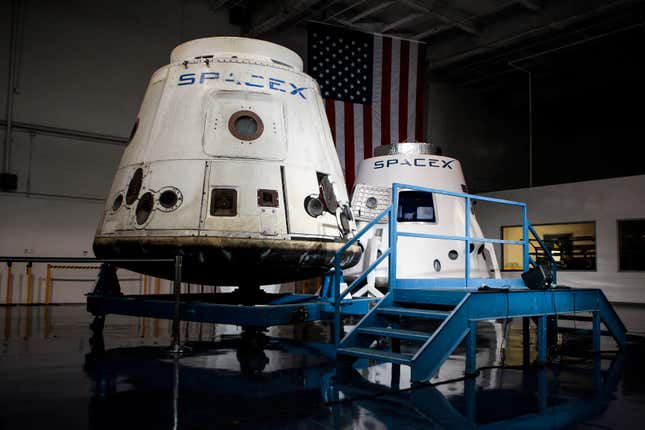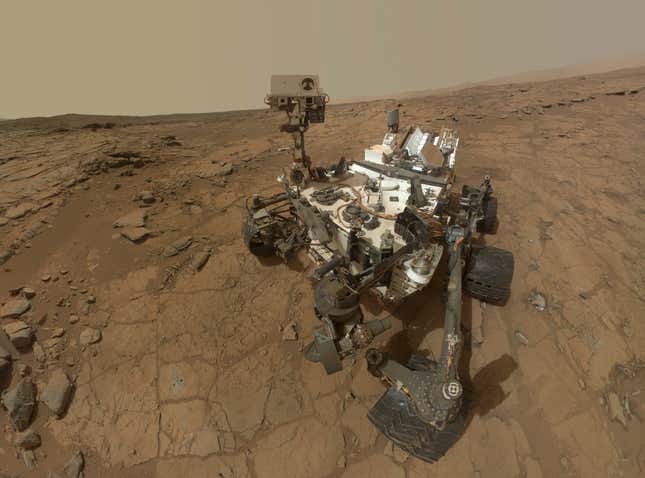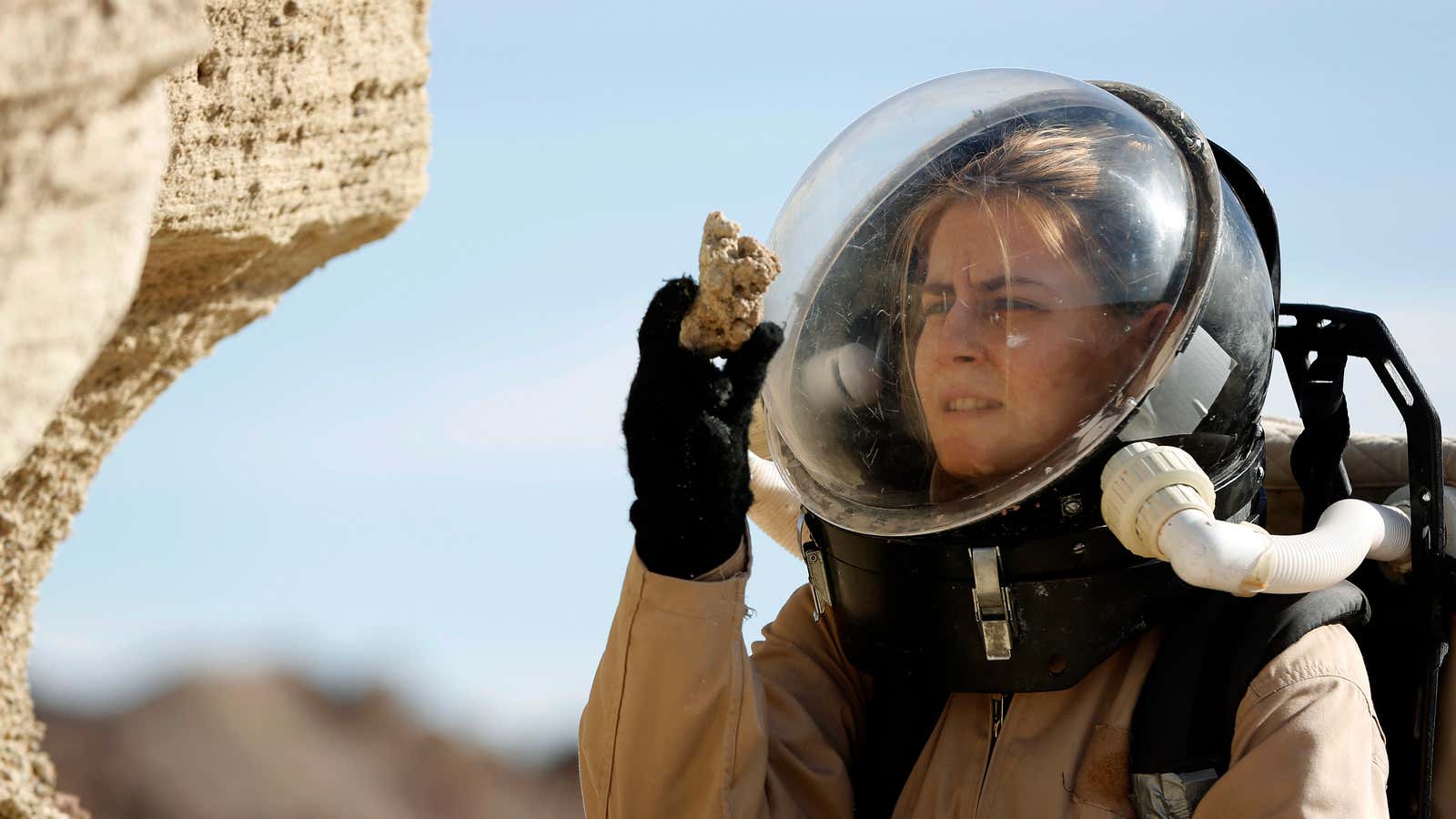This post has been corrected.
For many adventurers, the Red Planet has come to symbolize something more than simply space exploration—a hope for the future of humanity. Perhaps that explains why, throughout history, people have granted Mars a unique spot in our collective consciousness, and and why we’re so obsessed with finally colonizing it.
Case in point, in April 2013 the Dutch non-profit organization Mars One called on volunteers interested in taking a one-way trip to Mars. Despite the obvious personal sacrifices of such a mission, the organization received over 200,000 applications. When humans are willing to leave the only planet they’ve ever called home to face certain death tens of millions of miles away, it’s a sign that humanity’s love affair with the planet may have reached peak enthusiasm.
But where did this passion for the Red Planet come from? According to Sydney Do, a doctoral candidate at MIT focusing on space habitation and space life support, Mars’s mythic status probably dates back all the way to the Ancient Roman period; Mars is after all named for the Roman God of War. But historical fascination aside, our quest to colonize Mars says a lot civilization’s constant worrying about its fate.
A future beyond Earth
While not the closest planet to Earth, scientists have considered Mars to be the planet that most resembles Earth. This has lead to a very practical fascination.
In the 1960s, the first series of spacecraft was sent to neighboring planets and returned with pictures of Mars’ surface as a barren world with craters, much like Earth’s Moon. Luckily for Mars enthusiasts, Mariner missions returned a decade later showing a different version of Mars, one with huge volcanoes, sand dunes, dry riverbeds, and grand canyons stretching thousands of miles.
This relative familiarity has also fueled dreams that the planet could one day sustain human life. With its 24.6-hour days, snowy polar caps, and proximity to Earth, many people believe Mars is realistically suitable for building a permanent human presence. As Earth’s limited natural resources dwindle, the thinking is simple: if Earth isn’t giving us what we need, maybe space will.
“Mars has been unanimously agreed upon by the world’s space agencies as the ‘horizon goal’ for human spaceflight,” said Do, part of the MIT research group responsible for a widely read report debunking Mars One’s mission as unfeasible. “It is widely agreed that Mars is the most promising destination for near term colonization.”
For Billionaire Elon Musk, colonization is beyond the dreaming stage, however. The colorful South African CEO of Tesla has said that colonization is required if we are to protect the future of humanity. Earlier this year, Musk’s privately-owned space exploration company, SpaceX, announced it had raised over $1 billion for spaceship manufacturing from companies like Google and rocket rides with the private company are booked out for years. Meanwhile, Virgin’s Richard Branson is determined to launch the first commercial spaceline, Virgin Galactic, to send people to sub-orbital space and has made it very clear he’s determined to be a part of starting a human population on Mars.

But Musk and Branson are only the latest would-be colonizers. In 1979, scientist Benton Clark published the first papers examining what it takes to support life on Martian surface called “The Viking Results—The Case for Man on Mars.” In the paper, Clark postulated that human expeditions could reduce supply weight by “extracting water from Martian dirt and splitting oxygen from Martian atmospheric carbon dioxide.”
Just a few years later, in 1981, a group of people called the “Mars Underground” held their first Case for Mars conference in Boulder, Colorado in order to brainstorm ideas for exploring Mars.
But while there has been a lot of detailed analysis done on exploring Mars before returning back to Earth, Do said little “serious” research has been published on colonizing the planet. Since no human has ever set foot on Mars, we simply don’t know what it’ll really take to sustain life on the alien planet.
Martian fever
Such concerns are likely to fall on deaf ears, however, given the celebrated place Mars has taken up in our national pop cultural psyche.
In the mid-1800s American astronomer Percival Lowell pointed his telescope at the starry skies, peered at neighboring Mars through his lens, and saw what he believed to be canals. Lowell then spent the rest of his life trying to convince others that an intelligent population existed near those infamous canals. In fact, he actually believed that Mars was an older Earth inhabited by “a race of civil engineers who had dug a planet-girdling network of irrigation canals to stave off the encroaching red desert.”
“[Lowell] thought that there were signs of intelligent life on Mars and and he was kind of one of the earlier influencers that popularized Mars,” said Do. “I think ever since [Lowell], Mars has been kind of stuck in our culture.”
Several decades later, in the early 1950s, German rocket pioneer Wernher von Braun wrote a series of articles about space for Collier’s, a popular weekly magazine. His pieces were widely read and the concept of Mars colonization made its way into the average American household.
In his pieces, von Braun explored the fascinating psychological problems that would come from a long voyage to Mars:
At the end of a few months, someone is likely to go berserk. Little mannerisms—the way a man cracks his knuckles, blows his nose, the way he grins, talks or gestures—create tension and hatred which could lead to murder . . . [i]f somebody does crack, you can’t call off the expedition and return to Earth. You’ll have to take him with you.
So began Mars’ larger-than-life status in western literature, songs, and especially movies, exemplified by such cult American classics as 1964’s Santa Claus Conquers the Martians and 1996’s Mars Attacks!
Time for a reality check
Unfortunately, it has been easier to sustain our cinematic interest in Mars over the past few decades than it has been to actually make any scientific progress towards a Martian landing.
Sustaining a human colony on the Red Planet is a real challenge, said Do, and a lot of our technology simply hasn’t been tested on Martian surface. The technology needed to breathe Martian air is “a very big challenge in and of itself,” Do warned.
Then there are other, albeit equally important considerations. “When you’re going to Mars, you’re going to come in really fast because you need to shoot yourself with quite a bit of energy to leave earth’s gravity well and go toward Mars,” he explained. “So, somehow something has to slow you down so that by the time you get to the Martian surface, you’ll speed to zero so you don’t crash…. Basically there’s not enough air molecules for a conventional parachute to slow you down, but there’s enough atmosphere to provide enough heating so that as you’re coming in, it can burn you up.”

If the first group of humans are lucky enough to safely touch down, they’ll have to figure out how to grow crops to keep themselves alive.
Still, Mars enthusiasts feel the Red Planet may finally be in reach. Programs like Apollo, which put 12 Americans on the Moon, only made many people—inside and outside space exploration communities—feel like Mars is the next logical destination. NASA recently tested smart glasses that would aid astronauts in Mars missions to access charts, maps, technical and navigation information, reported a March 2015 article in Computerworld.
Despite the challenges of any potential colonization attempt, it’s clear humankind has a better chance of survival if we split up. And as long as there are explorers who believe there’s something better out there beyond the atmosphere, and billionaires willing to fund them, our passionate love affair with Mars is unlikely to cool anytime soon.
Correction: Virgin Galactic is planning on sending people to sub-orbital space, not Mars, as previously stated. Richard Branson has spoken of his determination to start a population on Mars, however.
